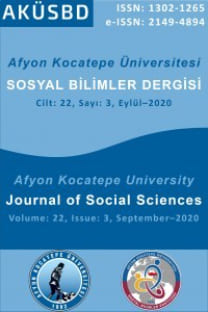Psikolojik güçlendirme ve güçlendirmeyi etkileyen faktörler: Türkiye’deki devlet hastanelerinde bir araştırma
Psychological empowerment and factors affecting psychological empowerment: A research in Turkey state hospitals
___
- ARSLANTAŞ, C. Cüneyt (2007). “Güçlendirici Lider Davranısının Psikolojık Güçlendirme Üzerindeki Etkisini Belirlemeye Yönelik Görgül Bir Arastırma”, Anadolu Üniversitesi Sosyal Bilimler Dergisi, 7(2): 227-240.
- BORDİN, C., Bartram T., and Casimir G. (2007). “The Antacedents and Consequences of Psychological Empowerment among Singaporean IT Employees”. Management Research News. 30 (1): 34-46.
- CEYLAN, A, Çöl G, Gül H. (2005). “İşin Anlamlılığını Belirleyen Sosyal-Yapısal Özelliklerin Güçlendirmeye Olan Etkileri ve Sonuçları Üzerine Bir Araştırma”, Doğuş Üniversitesi Dergisi, 6 (1): 35-51.
- CONGER, Jay A. and Kanungo, Rabindra N. (1988). “The Empowerment Process: Integrating Theory and Practice”. The Academy of Management Review 13(3): 471-482.
- ÇÖL, Güner ve Ardıç, Kadir (2008). “Sosyal Yapısal Özelliklerin Örgüte Bağlılık Üzerine Etkileri”. İktisadi ve İdari Bilimler Dergisi, 22 (2): 157-174.
- DOĞAN, Selen ve Demiral, Özge (2009). “Örgütsel Bağlılığın Sağlanmasında Personel Güçlendirme ve Psikolojik Sözleşmenin Etkisine İlişkin Bir Araştırma”. Erciyes Üniversitesi İktisadi ve İdari Bilimler Fakültesi Dergisi 32(48): 47-80.
- ERGENELİ, A, Arı GS, Metin S. (2007). “Psyhological Empowerment and Its Relationship to Trust in Immediate Mangers”. Journal of Business Research 60: 41-49.
- GREASLEY, K., Bryman A.,and Naismith N. (2008). “Understanding Empowerment from An Employee Perspective. What Does It Mean and Do They Want It?”. Team Performance Management 14 (1/2): 39-55.
- GKOREZİS, Panagiotis and Petridou, Eugenia (2009). The Impact of Extrinsic Rewards on Nurses’ Psychological Empowerment: The Case of Health Care in Greece.
- http://www2.lse.ac.uk/europeanInstitute/research/hellenicObservatory/pdf/ 4th_%20Symposium/PAPERS_PPS/ECON_PSYCH_EXP_ECNMCS/GK OREZIS.pdf (15.05.2011).
- GÜL, Hasan ve Çöl, Güner (2004). “Personeli Güçlü Kılan Örgütsel Bir Yapı Oluşturmada Sosyal-Yapısal Öncüllerin Güçlendirmeye Olan Etkileri ve Sonuçları Üzerine Bir Araştırma”. İktisadi Ve İdari Bilimler Dergisi 18(3-4): 249-272.
- HERNANDEZ, JS, Dale JC, Bennet KE, Varkey P (2010), “Challenges and Opportunities for Medical Directors in Pathology and Laboratory Medicine Standardization, Integration, and Innovation”, Am J Clin Pathol,133:8-13.
- ILES, Valerie and Sutherland, Kim (2001) “Organizational Change: A Review For Health Care Managers, Professıonals and Researchers” Managing Change in NHS.
- KALAYCI, Şeref (Ed.) (2006). “SPSS Uygulamalı Çok Değişkenli İstatistik Teknikleri” 2. Baskı, Ankara, Asil Yayıncılık.
- KURT, İlge (2010). “Rol Stres Kaynakları ve İş Tatmini Arasındaki İlişkide Amirin Algılanan Sosyal Desteğinin Etkisi”. Organizasyon ve Yönetim Bilimleri Dergisi, 2(1): 79-87.
- LASCINGER, Heather K. Spence, and Sullivan, Donna (1996). “Staff Nurse Work Empowerment and Perceived Control over Nursing Practice: Conditions for Work Effectiveness”, The Journal of Nursing Administration 26(9): 27-35.
- LI IC, Chen YC, and Kuo HT.(2008). “The Relationship between Work Empowerment and Work Stress Perceived by Nurses at Long- Therm Care Facilities in Taipei City”. Journal of Clinical Nursing, 17: 3050-3058.
- LLOYD, P, Braithwaite J, Southon G. (1999). "Empowerment and The Performance of Health Services". Journal of Management in Medicine 13(2): 83 – 94.
- MEYERSON, Shauna L. and Kline, Theresa J.B.(2008). “Psychological and Environmental Empowerment: Antecedents And Consequences”. Leadership & Organization Development Journal,29(5): 444-460.
- NEDD, N. (2006). “Perceptions of empowerment and intent to stay”. Nursing Economics 24(1): 13-18.
- O’BRIEN, Janice L. (2010). Structural Empowerment, Psychological Empowerment and Burnout in Registered Staff Nurses Working in Outpatient Dialysis Centers. The degree of Doctor of Philosophy The State University of New Jersey. http://mss3.libraries.rutgers.edu/dlr/TMP/rutgers-lib_27205-PDF-1.pdf (25.05.2011).
- OMACHONU, Vincent K, and Einspruch, Norman G. (2010) “Innovation in Healthcare Delivery Systems: A Conceptual Framework” The Innovation Journal: The Public Sector Innovation Journal, 15(1): 1-20.
- PELTIER, J. and Dahl, A. (2009) “The Relationship between Employee Satisfaction and Hospital Patient Experiences”. Forum for Peaple Performance Management and Measurement. (erişim, Şubat 17,2011)
- http://www.docstoc.com/docs/58837959/Hospital-Study--Relationship- Btwn-Emp-Satisfaction-and-Pt-Experiences
- REGAN, LC, and Rodriguez L. (2011) “Nurse Empowerment from a Middle- Management Perspective: Nurse Managers’ and Assistant Nurse Managers’ Workplace Empowerment Views”. The Permanente Journal 15 (1): 101-107.
- SARMIENTO, TP, Laschinger, HKS. and Iwasiw, C.(2004). "Nurse Educators' Workplace Empowerment, Burnout, and Job Satisfaction: Testing Kanter's Theory”. Journal of Advanced Nursing 46(2): 134–143.
- SIGLER, TH and Pearson CM. (2000). “Creating an Empowering Culture: Examining the Relationship between Organizational Culture and Perceptions of Empowerment”. Journal of Quality Management 5(1): 27-52.
- SMITH, Sheila M.(2008). “The Impact of Structural Empowerment on Project Manager's Organizational Commitment”. Journal of Academy of Business and Economics 8(1): 171-178.
- SPREITZER, Gretchen M.(1995). “Psychological Empowerment in The Workplace: Dimensions, Measurement, and Validation”. Academy of Management Journal 38(5): 1442-1465.
- SPREITZER, Gretchen M. (1996). “Social Structural Charecteristics 0f Psychological Empowerment”. Academy of Management Journal 39(2): 483- 504.
- SPREITZER, GM, Kizilos MA, and Nason SW (1997). “A Dimensional Analysis of the Relationship between Psychological Empowerment and Effectiveness, Satisfaction and Strain”. Journal of Management 23(5): 679-704.
- SPREITZER, GM, De Janasz SC and Robert EQ. (1999) “Empowered to Lead of Psychological Empowerment in Leadership”. Journal of Organizational Behavior, 20: 511-526.
- SPREITZER, G. (2007) “Taking stok: A Review of More Than Twenty Years of Research on Empowerment at Work” J. Barling(Ed), CP. Cooper(Ed), In The
- SAGE Handbook of Organizational Behaviour: Volume 1. pp.54-72. Sage publication. Erişim 10 Mart 2011. http://webuser.bus.umich.edu/spreitze/ empowermentandself-management.pdf
- ŞİMŞEK, Ö. F. (2007). Yapısal Eşitlik Modellemesine Giriş‐Temel İlkeler ve LISREL Uygulamaları. Ankara: Ekinoks.
- THOMAS, Kenneth W. and Velthouse, Betty A. (1990). “Cognitive Elements of Empowerment: An "Interpretive" Model of Intrinsic Task Motivation”. The Academy of Management Review, 15(4): 666-681.
- TUTAR, Filiz ve Kılınç, Nurcan (2007) “Türkiye’nin Sağlık Sektöründeki Ekonomik Gelişmişlik Potansiyeli ve Farklı Ülke Örnekleriyle Mukayesesi” Afyon Kocatepe Üniversitesi İ.İ.B.F. Dergisi 9: 1-11.
- VIGANO. (2009) “Work-related stress in healthcare workers: evaluation of effectiveness of a short training course in the hospital environment”. G Ital Med Lav Ergon, 31(2): 233-235.
- http://www.canaktan.org/ekonomi/saglik-degisim-caginda/pdf-aktan/durumanalizi. pdf. Erişim 10 Mart 2011.
- ISSN: 1302-1265
- Yayın Aralığı: 4
- Başlangıç: 1999
- Yayıncı: Afyon Kocatepe Üniversitesi Sosyal Bilimler Enstitüsü
Başlıca coğrafi içerikli atasözleri ve bunların milli kültür açısından analizi
Konya’nın iklim özelliklerinin tahıl tarımına etkileri
Gazzali’den sonra İslam düşüncesi seyrinde İbn Kemmune’nin yeri ve önemi
Serkan ÖZDEMİR, Cemal ELİTAŞ, Mehtap KARAKOÇ
Dışlanma, ayrımcılık, mezhep ve etniklikler arası eşitsizlikler
Wolfgang Amadeus Mozart Si Bemol Majör Fagot Konçertosu’nun analizi ve incelenmesi (K191)”
